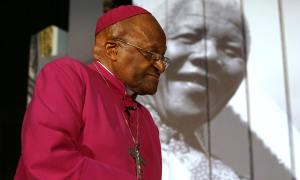 Never underestimate the significance of planned and unplanned acts of kindness.
Never underestimate the significance of planned and unplanned acts of kindness.
The African bishop, Desmond Tutu, was once asked why he became an Anglican rather than joining some other denomination. He replied that in the days of apartheid, when a black person and a white person met while walking on a footpath, the black person was expected to step into the gutter to allow the white person to pass and then nod his head as a gesture of respect.
“One day,” Tutu said, “when I was just a little boy, my mother and I were walking down the street when a tall, white man, dressed in a black suit, came toward us. Before my mother and I could step off the sidewalk, as was expected of us, this man stepped off the sidewalk and, as my mother and I passed, tipped his hat in a gesture of respect to her! I was more than surprised at what had happened, and I asked my mother, ‘Why did that white man do that?’ My mother explained, ‘He’s an Anglican priest. He’s a man of God, that’s why he did it.’ When she told me that he was an Anglican priest, I decided there and then that I wanted to be an Anglican priest too. And what is more, I wanted to be a man of God.”
Desmond Tutu was one of the key contributors to the abolishment of apartheid in South Africa.
When I was a child, I had a similar moment of grace extended to me by a pastor in my church. One Wednesday evening I brought a toy pellet gun to church. A friend of mine and I found an empty room next to the fellowship hall, lined up some paper cups, and had target practice.
When one of our pastors unexpectedly came into the room, we knew we were in trouble. But instead of the expected reprimand, he said, “Hi boys. Looks like you’re having fun. That’s a neat pistol you’ve got. Can I shoot it?” Our tenseness eased as he shot several pellets at the targets. But I’ll never forget what happened next. He bent over, picked up the pellets off the floor (the ones he had shot), and handed them to me. His gentleness and kindness made a deep and lasting impact on my young heart.
Kind deeds emanate from a tender, humble, others-centered life. When we’re self-focused and preoccupied, kind acts are elusive.
Kind deeds are often simple and don’t take long to do, but they are high-impact.
Be kind.
Summary
What? – Kind deeds are not only helpful to recipients, they often make a positive and lasting impact.
So what? – We can help people and, at times, deeply impact their lives through planned and unplanned acts of kindness.
Now what? – Perform planned and unplanned acts of kindness.
Leaders – This concept – performing acts of kindness – is seldom found in the working vocabulary of organizations. Have you ever seen the concept mentioned in the annual report of a Fortune 500 company? Or on the agenda of a staff meeting? But if it works on a personal level, I think it can be advantageous to an organization. Altruistic acts will strengthen the moral fiber of an organization and may even positively impact its financials. Discuss with your team what this concept would look like in your organization.
Send this essay to a friend by clicking the envelope icon at the bottom of the page.

I love this, Don. Inspiring examples truly are what change us– not simply lectures or sermons. Kind of makes me want to become an Anglican priest, you know? Thanks.